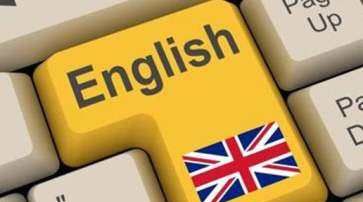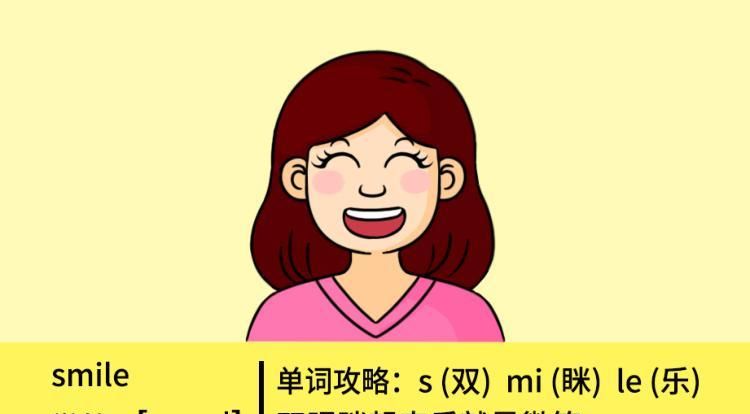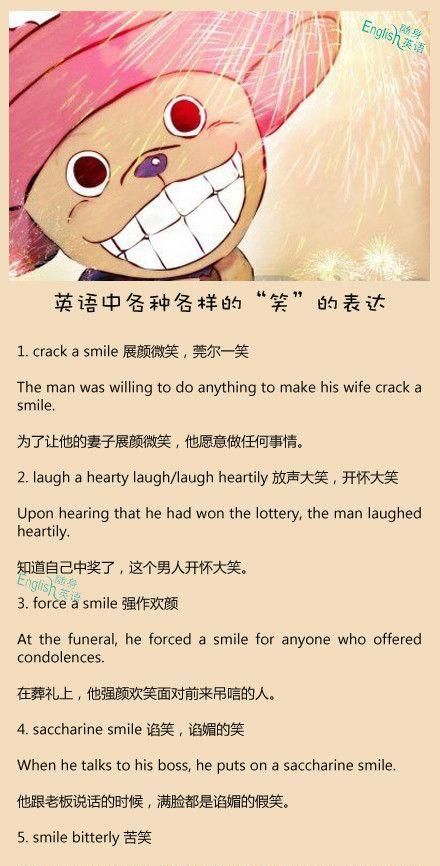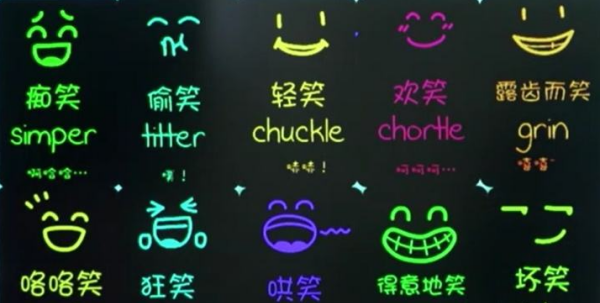本文目录
笑的英语词汇
关于“笑”的英语词汇
笑,除了laugh和smile,你还能想到哪些词? 下面是我为大家整理的关于“笑”的英语词汇,欢迎参考~

微笑 - smile
【释义】
The corners of your mouth move outwards and slightly upwards.
嘴角向外运动并轻微向上扬起。
【例句】
Her smile makes her even more beautiful.
她的微笑使她更美丽了。
大笑 - laugh
【释义】
To make a noise to show one's amusement and happiness. You can laugh at a joke or at an amusing sight. You can laugh at someone without being amused.
发出声音以表现出愉快的情绪。听到笑话或看到有趣的场景人会大笑。即使没有逗趣的事情人也能大笑。
【例句】
Laugh, and the world laughs with you; weep, and you weep alone.
你笑,世界也会跟着你一起笑。你哭,却只能独自一人。
露齿而笑 - grin
【释义】
To smile with the teeth.
露出牙齿地微笑。
【例句】
People who confess to feeling happy also grin more than others.
承认感觉幸福的人们也会比别人更喜欢咧着嘴笑。
轻声地笑 - chuckle
【释义】
To laugh quietly.
不发出声音地静静地笑着。
【例句】
She was roused by a chuckle which Mr. Dorset seemed to eject from the depths of his lean throat.
多森先生从他那瘦弱的喉咙深处迸出一阵笑声,把她吓了一跳。
咯咯笑 - giggle
【释义】
To laugh repeatedly foolishly and uncontrollably, esp. by girls.
无法控制地不断傻笑,通常用来形容女孩。
【例句】
There was silence for a moment, then a giggle.
沉默了片刻之后,有人在吃吃地笑。
坏笑 - snicker
【释义】
To laugh in a disrespectful more or less secret way.
偷偷地略带鄙夷地笑。
【例句】
The shuffle and snicker become the comedian's trademark.
搅和与窃笑成为那个戏剧演员的'标志。
假笑 痴笑 - simper
【释义】
To smile in a silly unnatural way.
不自然地傻笑。
【例句】
I'll tell you, Scarlett O'Hara, if you'll take that Southern belle simper off your face.
我会告诉你的,斯佳丽·奥哈拉,只要你脸上别带着那种南方美人儿的傻笑。
得意的笑 - smirk
【释义】
To smile in a false or too satisfied way.
虚假地或是自鸣得意地微笑。
【例句】
Look at his smile, really more of a smirk.
看着他的笑容,那根本就是在得意地奸笑。
憋笑,痴痴地笑 - titter
【释义】
To laugh very quietly from nervousness or badly controlled amusement.
由于紧张或无法压抑的搞笑而偷偷地笑着。
【例句】
He was abusing with anger, but hearers laughed, even Hai Xi Xi close tightly his mouth to titter. I definitely gloated over him.
他怒冲冲地骂着,听的人却发出笑声,连海喜喜也抿着嘴偷笑,我当然更有点幸灾乐祸。
狂笑 - guffaw
【释义】
To laugh loudly and rudely.
大声而粗鲁地笑着。
【例句】
All the boys burst out into a guffaw at the joke.
听到这个笑话,男孩子们发出一声狂笑。
哄笑 - roar
【释义】
To laugh long and loudly.
持续不断地大笑。
【例句】
They roared after they heard the joke.
听了笑话后他们哄堂大笑。
欢笑 - chortle
【释义】
To give a laugh of pleasure or satisfaction.
因为开心或者满足而笑出来了。
【例句】
Father used to chortle over the funny funny papers every Sunday.
父亲以前每个星期天看到滑稽报纸,总要哈哈大笑。
嘲笑 嘲弄 - ridicule
【释义】
To laugh unkindly at or to make unkind fun of.
为了取笑别人而笑。
【例句】
Your conduct subjects you to public ridicule.
你的行为使你受世人嘲笑。
讥笑 - deride
【释义】
To laugh at or make fun of as of no value. /to mock
讥讽而不屑地笑话。
【例句】
Most of them, however, mock the clichés used to deride European business.
而其中多数人,念念不忘那些用来讥笑欧洲商业的陈词滥调。
嘲弄 - mock
【释义】
To laugh at sb(sth) when it is wrong to do so, esp. by copying in a funny or contemptuous way.
不怀好意地模仿别人来嘲笑某人。
【例句】
How dare a newspaper published in a country that invented the chip butty and the deep-fried Mars Bar mock the rich and varied cuisine of half a continent?
一个发明了薯条黄油三明治和油炸巧克力的国家出版的报刊,怎敢嘲弄另外半个大陆丰富多样的美食?
嘲笑 轻蔑地笑 - scoff
【释义】
To laugh at, to speak or act disrespectfully. /to speak in scornful mocking way.
出于不屑、轻蔑和不敬而嘲弄某人地笑。
【例句】
Some even scoff at the store's efforts to spruce up its image.
有人甚至把沃尔玛改善公司形象的努力也拿来大加嘲讽。
讥笑 - jeer
【释义】
To laugh rudely at /to insult sb in a loud, unpleasant way.
为羞辱别人而大声不敬地笑。
【例句】
The children liked to jeer at the awkward student.
孩子们喜欢讥笑这个笨学生。
;带有笑的英语单词 到0个以上再加0分的单词
笑的单词 laugh,cachinnate,cackle,guffaw.Informal heehaw,smile,beam,grin.giggle,snicker,snigger,titterbelly laugh [美口]纵声大笑; 逗人发笑的事物 holy laugh [laughing][美]充满宗教热情的笑 horse laugh 捧...

各种笑的英文表达方法
各种笑的英文表达汇总
表达是将思维所得的成果用语言等方式反映出来的一种行为。表达以交际、传播为目的,以物、事、情、理为内容,以语言为工具,以听者、读者为接收对象。以下是我精心整理的各种笑的英文表达作文,希望对大家有所帮助。
1 smile 微笑
Smile是一个概括性的表述(general term),可以表达各种心情愉悦的笑容。注意,它只表达面部表情(facial expression),不包括笑声(vocal expression)。
表情
the corners of your mouth curve up
嘴角上扬
you sometimes show your teeth
有时露出牙齿
情绪
being pleased, amused,or friendly
愉悦、被逗乐,或者友好
例句
When Jensen saw me, he smiled and winked at me.
詹森见到我时,笑着朝我眨了眨眼。
2 laugh 出声的笑
Laugh也是一个general term,但有发出笑声的含义,它可以是各种笑声和笑容的组合。
表情
The mouth is opened a bit more to let air in and out, the voice is then heard.
嘴张得稍大一些,气流进出,声音可闻。
While laughing, the body also makes slight shaking movements.
Laugh的时候,身体可能也会跟着轻轻颤抖。
情绪
happy or amused
开心,被逗乐
People also sometimes laugh when they feel nervous or are being unfriendly.
人们在感觉紧张或者不友好的时候,也有可能大笑出声。
例句
Hiddleston gave a deep rumbling laugh at his own joke.
抖森对自己讲的笑话报以朗声大笑。
3 beam 笑容满面
表情
you have a big smile on your face
脸上绽开大大的笑容
smile radiantly
灿烂的笑容
情绪
You are happy, pleased, or proud about something.
你因为某些事而感觉到幸福、愉悦、骄傲。
例句
a beaming face 笑容满面
Joseph's entire face beamed with happiness.
囧瑟夫的'脸上洋溢着幸福的笑容。
4 grin 露齿而笑
表情
smile broadly and show teeth
咧嘴笑,露出牙齿
turning up the corners of the mouth
嘴角上扬
情绪
usually shows pleasure or amusement
通常表达愉快、开心的心情
has mischievous hidden connotations
带些淘气的意味
例句
Benedict was grinning like an idiot when telling his mum that he had been nominated for an Oscar.
卷福告诉妈妈他被提名奥斯卡的时候,笑得像个傻瓜。
5 smirk 得意地笑
表情
an asymetric smile, with one corner of the mouth turned up
非对称的笑容,一边嘴角上翘
情绪
smugness or scorn
得意或轻蔑
例句
Sherlock deduced the man's occupation in 5 seconds and smirked.
夏洛克5秒钟就推理出这人的职业,他得意一笑。
6 chuckle 轻声笑
表情&声音
laugh quietly or with restraint
轻声地笑,克制地笑
making a little bit of a clucking sound
轻轻发出咯咯声
情绪
restrained amusement
被逗乐了,但是控制情绪
例句
Brad Pitt chuckled to himself.
布拉德·皮特忍俊不禁,暗自轻声。
7 guffaw 狂笑、哄笑
表情&声音
a burst of loud hearty laughter
开怀大笑,发出很大笑声
laugh boisterously
笑得很喧闹
情绪
unrestrained
纵情的
例句
Leonardo managed to keep a straight face for a minute before he let loose with a loud guffaw.
小李子的正经脸还没坚持一分钟,就绷不住狂笑起来。
8 giggle 咯咯傻笑
表情
a foolish or nervous laugh
傻气或紧张的笑
slight shaking of the body
浑身轻轻颤抖
often with the hand covering the mouth
常用手遮着嘴
情绪
amused, nervous, or embarrassed
被逗乐、紧张或尴尬
tends to be associated with silliness
这个词通常和傻气联系起来
例句
"We can't giggle, it's a crime scene. Stop it," said John Watson.
华生说,“我们不能这样傻笑,这是犯罪现场,快别笑了。”
9 snicker 窃笑、坏笑
表情
laugh briefly, often secretly (hand over mouth)
转瞬即逝的笑,通常是偷偷地笑(手捂着嘴)
laugh in a half-suppressed, indecorous manner
笑得不太克制,不太得体
a sly or disrespectful laugh
狡猾、不礼貌的笑
情绪
sarcastical
讽刺的
例句
I looked at Jude, on the seat next to me; I thought I had heard him snicker.
我看着在我旁边座位上的裘德·洛,我觉得我刚刚听见他偷笑了。
10 chortle 欢笑
表情
Chuckle gleefully
高兴地咯咯笑
laugh in a breathy, gleeful way
开心着笑,带着气喘
an explosive vocal sound
爆发出的笑声
情绪
with pleasure, amused
愉悦,被逗乐
mirth
欢乐
例句
Matt Bomer chortled gently at his joke.
听了他的笑话,孔雀轻声欢笑起来。
11 sneer 冷笑
表情
a slight raising of one corner of the upper lip
上嘴唇的一角翘起
情绪
to show that you have no respect for sb
表示你不尊重某人
contempt
轻蔑
例句
A faint sneer of satisfaction crossed Snape’s face.
斯内普教授的脸上掠过一丝得意的冷笑。
12 titter 尴尬偷笑
表情
to laugh in a restrained, self-conscious, or affected way
克制的,难为情的,或做作的笑
情绪
from nervousness or embarrassment
因为紧张或尴尬而笑
or in ill-suppressed amusement
或没掩饰好的开心
例句
Merlin began to titter nervously.
梅林紧张地低笑起来。
13 simper 痴笑
表情&情绪
to smile in a silly and annoying way
傻气而讨人厌的笑法
Smile affectedly or derisively
笑得忸怩作态,或带些嘲讽
例句
Sebastian simpered at the beautiful young girl.
384对着那个漂亮姑娘嬉笑起来。
扩展阅读:
01
常见“哭”的单词:
①
sob
呜咽;抽噎
特指有哭声或者急促喘息声的哭
例:
She began to sob again, burying her face in the pillow.
她又开始抽噎,把脸埋在枕头里。
还有一个类似的单词
whimper抽泣; 呜咽
例:
She lay at the bottom of the stairs, whimpering in pain.
她躺在楼梯的下面,痛苦地抽泣。
打开百度APP看高清图片
②
weep
(通常因悲伤) 哭泣,流泪
侧重于无声流泪的哭
例:
Jacob started to weep.
Jacob哭了起来。
③
wail
哀嚎;恸哭
例:
He began to wail in mourning.
他开始痛哭。
02
常见“哭”的短语:
①
a lump in one's throat
例:
I tell you, it puts a lump in your throat.
我告诉你,这简直让人哽咽。
②
be in tears
哭泣;流泪
例:
I found him in tears in his bedroom.
我发现他在卧室里哭。
burst into tears
突然哭起来
burst[bst]突然,突发
例:
Laura burst into tears and ran out of the room.
劳拉突然哭了起来,然后从房子里跑了出去。
③
fight back tears
强忍着眼泪
例:
Bill fought back his tears and tried to comfort Sarah’s mother.
比尔强忍着眼泪,并试图安慰桑拉的母亲。
④
somebody's eyes water
(风、烟雾等) 使眼睛淌眼泪
例:
John's eyes were watering from the smoke that filled the room.
约翰的双眼正被因满屋的烟雾熏得淌眼泪。
⑤
break down
感情失控(痛哭起来);大哭
例:
I don't want to break down in front of the children.
我不想在孩子们面前大哭。
⑥
be close to tears
快要哭了
也可以表达为:be on the verge of tears
例:
Her hands were shaking. She was on the verge of tears but James didn’t realize that.
她的手在颤抖,她快要哭出来了,但詹姆斯一点也没有意识到这一切。
;
收集一些关于笑的英语单词怎么写
关于笑的英语单词有:
1、smile
读音:英[smaɪl],美[smaɪl]。
释义:
v. 微笑;笑;微笑着说;微笑地表示;现出(笑容)。
n. 微笑;笑容。
例句:She has a special way of smiling.
她微笑的样子有些特别。
2、laugh
读音:英[lɑːf],美[læf]。
释义:
v. 笑;发笑;(特别表示因成功而)处于有利地位。
n. 笑声;令人开心的时刻;引人发笑的事;笑料;引人发笑的人;逗笑好玩的人。
例句:It is natural to laugh when you are happy.
高兴时笑是正常的。

3、grin
读音:英[ɡrɪn],美[ɡrɪn]。
释义:
v. 咧嘴笑;露齿而笑;咧着嘴笑;龇着牙笑。
n. 咧着嘴笑;露齿的笑。
例句:He had a large grin on his face .
他咧嘴笑得很开心。
4、smirk
读音:英[smɜːk]美[smɜːrk]
释义:
vi. 傻笑;自鸣得意地笑。
n. 假笑;傻笑,得意的笑。
例句:Edward was standing at the foot of my bed, smirking.
爱德华站在我的床脚边,懒洋洋地、略带得意地傻笑着。
5、guffaw
读音:英[ɡəˈfɔː]美[ɡəˈfɔː]
释义:
v. 大笑;哄笑;狂笑。
n. 大笑,狂笑。
例句:She let out a loud guffaw.
她嘎嘎大笑起来。
以上就是关于英语中有关笑的单词,笑的英语词汇的全部内容,以及英语中有关笑的单词 的相关内容,希望能够帮到您。
